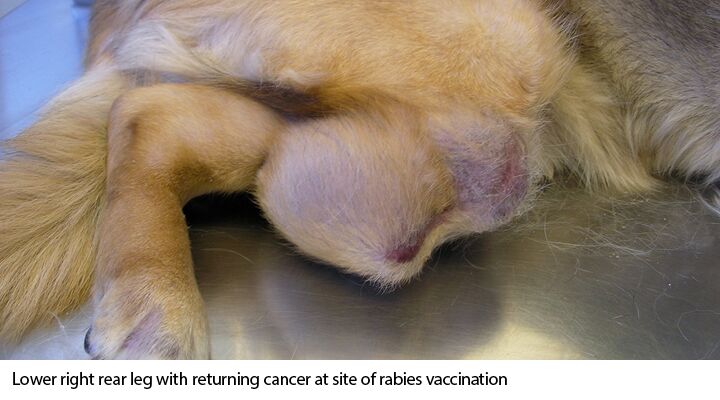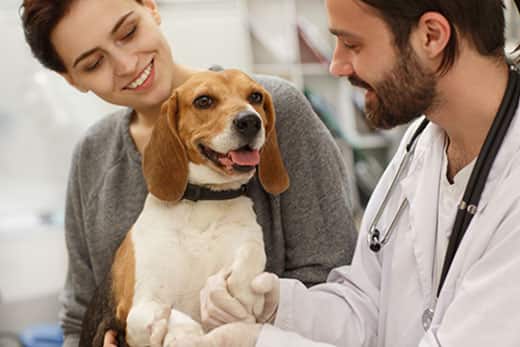
Nā hopena ʻaoʻao o ka lāʻau lapaʻau ʻīlio
Rabies is a highly contagious, deadly viral disease. It affects not only dogs, but also cats and other mammals, including humans. Fortunately, rabies in dogs can be completely prevented with the right vaccination. How the rabies vaccine works, in what cases after vaccination you need to see a doctor – in the article.
Contents
How the rabies vaccine works
All rabies vaccines for dogs used in the US and Canada are inactivated, or killed. This means that the virus has been neutralized and is not capable of infecting the animal.
Although most vaccines require two to four initial shots, the rabies vaccine works a little differently. Like other killed vaccines, the initial dose of rabies vaccine triggers the immune system to produce antibodies that can fight rabies if the dog becomes infected. Rabies is a slow-acting virus that may not show symptoms for several weeks to several months, allowing the dog’s body to develop an immune response and fight the infection. The rabies vaccine is so effective that vaccinated dogs rarely become infected.
Post-vaccination antibodies weaken over time, causing the rabies vaccine to lose its effectiveness. Therefore, the dog needs regular revaccination. Pets usually receive one booster vaccine one year after the first shot and then every one to three years to maintain immunity. In most regions, pet owners are required by law to regularly vaccinate their pets against rabies.
Common dog reactions to rabies vaccination
Since the action of any vaccine is to stimulate the immune system, the consequences of a rabies vaccination in a dog are usually associated with this. These may include mild fever, mild loss of appetite, and mild to moderate lethargy within 24 to 36 hours of vaccination.
Occasionally, animals develop a slight, painless swelling at the injection site, which may persist for a couple of weeks. In rare cases, a small round bald patch may form at the injection site.
Some animals experience no side effects at all. If a dog does react to the rabies vaccine, symptoms usually appear within an hour of vaccination and disappear within one to two days.

Rare side effects of rabies vaccine in dogs
While this is rare, your pet may develop a more severe reaction to the rabies vaccine. This is usually not due to the vaccine itself, but to an overreaction of the individual dog’s immune system.
Serious side effects usually appear immediately or within one to two hours after vaccination.
Keia mau puke:
- urticaria, which manifests itself in the form of hard lumps all over the dog’s body, which may or may not itch;
- ka luaʻi;
- pāhoehoe;
- swollen face or eyes;
- severe pain or swelling at the injection site;
- ʻūhā;
- collapse or fainting.
If your pet exhibits one of these symptoms, you should immediately take your dog to the veterinarian for emergency care.
The dog is ill after vaccination: what to do
Lethargy for a day or two, mild fever, mild soreness, and temporary loss of appetite are all indications that the vaccine is doing its job, that is, stimulating the immune system. In this case, you need to give the pet a rest, surround it with care and love, and watch it for several days.
If your dog seems to be in pain or is worried, you should contact your veterinarian for advice. He or she may prescribe prescription pain medications to help relieve the pet’s condition.
As a rule, the following situations require emergency contact with a specialist:
- expected mild side effects get worse or last longer than a few days;
- a hot to the touch or painful swelling at the injection site that releases moisture, increases in size or does not go away within a couple of weeks;
- serious or abnormal reactions develop.
Canine Rabies Vaccine Alternatives
If your pet has an adverse reaction to the rabies vaccine, you should discuss the situation with your veterinarian. Since the laws in each country are different, it is the specialist who will be the best source of information on whether it is possible for a dog not to have these vaccinations. Alternatively, a titrimetric test can be performed by a veterinarian to show the level of antibodies in the blood. This will help determine if the animal has enough antibodies to protect against the disease.
If your dog has had adverse reactions to vaccines in the past, the risk of vaccination and infection should be discussed with your veterinarian. If the pet is sensitive to the vaccine, the specialist can manage adverse side effects with antihistamines or other medications before vaccination, and then monitor for reactions.
E nānā i kekahi:
- Nā hōʻailona o nā maʻi maʻamau i nā ʻīlio kahiko a me nā ʻīlio kahiko
- Love for pets: why do people love cats and dogs?
- Diseases of puppies: symptoms of canine distemper and parvovirus enteritis
- Ke koho ʻana i kahi kauka holoholona





